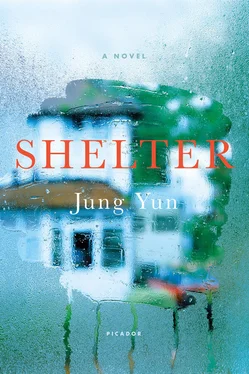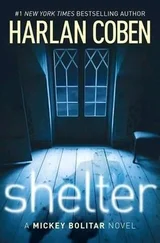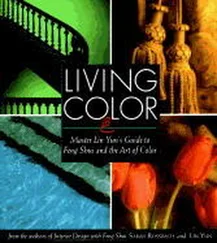“Are you all right?”
She stares at him, her lower lip in full tremor.
“Molly? What’s going on?”
“Why did we do that?” she asks. “Why?”
He doesn’t know what she expects him to say. He can’t answer for her; he can hardly answer for himself. “Because we wanted to, I guess.”
She continues staring at him, clutching the ends of the sweater still tied around her neck. Whatever confusion she may have felt is gone now, replaced by something that begins to resemble fear.
“Maybe you should sit.”
When he takes a step toward her, she jumps away, nearly tripping on the underwear around her ankles. He reaches out to break her fall, but this only seems to frighten her more. She picks up the frying pan in the sink, raising it at him like a weapon.
“Why are you acting like this?”
“Don’t touch me,” she says. She takes a small step to her left, then another, and another, still holding the pan as she nears the door.
“What do you mean, ‘Don’t touch me’? What were we just doing?”
The trembling in her lower lip returns, and suddenly, she’s sliding down the wall, knees splayed as she falls to the floor, all limbs and noise and tears. The thick, perfect lashes he admired only minutes ago streak down her face in watery black stripes. A bubble of mucus expands and contracts from her nostril with each breath. Kyung stands perfectly still, too stunned by her reaction to respond, but the sound of her voice — that awful, hiccupped wail — he can’t listen to it much longer.
“Molly,” he says quietly. “What happened? What just changed?”
She shakes her head.
“Did I hurt you somehow?” He reaches for her again, but she leans away to avoid being touched. “Look, I don’t understand what’s going on right now, but I’m not sorry we did that.”
The statement doesn’t quiet her, but it reassures him to hear the words out loud. He has nothing to apologize for. He didn’t do anything that Molly didn’t want, that she didn’t respond to eagerly. Regret is the only reason she’s sitting on the floor.
“Could you please — please stop crying?”
This only makes her cry louder, so much so that he begins to worry the neighbors will overhear. He shuts an open window and fills a glass with water from the sink. When he offers it to her, she knocks it away, sending the plastic cup spinning like a top. It skitters across the tile, spraying water on the cabinets and floor. When the cup stops moving, he sits down beside it, folding his hands in his lap where she can see them. He tells himself to be patient; eventually, she’ll wear herself out. But minutes pass, and she continues to wail.
“Do you remember when you lived in that house on Larkin Street?” he asks.
She stops crying just long enough to gasp for air.
“That big one with the white fence?”
“Why — why are you asking me that now?”
Kyung still sees the house clearly, with its brick face and orange shutters and matching orange mailbox. In junior high, he walked past it every day after school, slowing down as he neared the fence to listen and wait. Sometimes he heard nothing. Sometimes he heard Molly’s parents fighting inside. He knew what a punch and a slap sounded like. He was all too familiar with the sound of a woman crying. He listened as long as he could, stopping to tie his shoe or search his book bag for something he didn’t need. The next day, he’d watch Molly in the cafeteria or in the halls, acting out as if the world owed her something. Secretly, he admired her for this. She’d earned the chip on her shoulder and she wasn’t afraid to show people it was there. She did what she wanted, got in trouble, and made her parents as miserable as they made her, which was exactly what they deserved. He looked up to her for this until she decided not to be that person anymore, which always felt like a betrayal.
“I wish we could have been friends back then,” he says. “I think we would have understood each other. Helped each other, maybe.”
She’s no longer crying so much as fighting the urge to cry, choking off the sound as it reaches her throat. “It’s too late.”
“I know.” He stands up and offers his hand, trying to get Molly on her feet. “Come on.”
She looks at him, her face still smeared and striped with black, her hair as disheveled as he’s ever seen it. He smiles at her anyway, wondering how she’ll explain her appearance when she gets home. The thought is nothing more than that at first. A thought, a flicker. But suddenly, it combusts.
“You’re not — we’re not going to tell anyone about this, are we?”
Molly closes her eyes and wipes her face with her dress, leaving a stain on the fabric that looks like an inkblot. Then she exhales and slowly reaches for his hand, staring at him until her fingertips are almost touching his. Kyung is so relieved to see her accepting his help, he doesn’t notice the flash at first, another bright blur of pink as something sharp and painful rips across his cheek.
“Molly!” he shouts. But she’s already running for it, her sweater flapping behind her like a cape.
Kyung stands in the open doorway, watching the Buick back out and tear down the street. Half a block away, and she’s still gunning the engine, as if she expects him to follow. Molly doesn’t yield, much less stop at the intersection before turning, causing another driver to slam on his brakes. When her car disappears, he reaches up to touch his stinging cheek. There’s blood on his fingertips. There’s blood everywhere, actually. Fresh red drops of it on his hands and shirt and pants. He walks back inside and closes the door, scanning the kitchen, which is even messier than it was before. The pitcher that fell off the counter is lying in big, jagged shards beneath the sink. A fine powder of crushed glass dusts the area where they were standing. He looks himself over again, hopeful that the blood is all his, when he notices his feet, clad in thin, flimsy sandals. His bare skin is cut in so many places, it looks like he kicked in a window.
Kyung cleans up the glass and carefully deposits the broken pieces into an empty plastic bag. Then he ties the handles and pushes the bag deep into the trash where Gillian won’t find it. But covering his tracks is useless, he thinks. Molly is going to tell everyone. Her husband, his wife, maybe even his parents. Isn’t that what devout people do? Sin and repent; sin and repent again. He returns to his beer on the counter, emptying the rest of the can and immediately opening another before he can convince himself not to. Drinking is a choice, he thinks. His choice. Molly was too, and now he has to live with the consequences, however bad they might be. He’s fucked — he knows that — but for the first time, he’s fucked by something he chose to do, not something that was done to him, or something he had to do out of guilt or obligation or fear. He laughs even though his heart is pounding. This one belongs entirely to him.
* * *
Every summer, Kyung’s parents invited him to visit the beach house with Ethan and Gillian. And every summer, he declined, unwilling to spend an entire weekend in their company. His only glimpse of the property was the painting on his parents’ mantel in Marlboro, an abstract piece commissioned by his mother’s decorator as a gift. On canvas, the house seemed large, but unexceptional — a tall white block with a red front door. In person, it’s something else entirely. When the GPS tells him to turn onto a private road, Kyung hesitates, not quite believing what he sees. At the far end of the road, a single house sits high on a bluff, surrounded by a spectacular, expensive kind of nothing — no neighbors, no trees — just the sky above and a steep drop to the bay below. The three-story colonial looks like something out of a postcard, lit brightly from within as the last sliver of sun descends into the horizon.
Читать дальше












